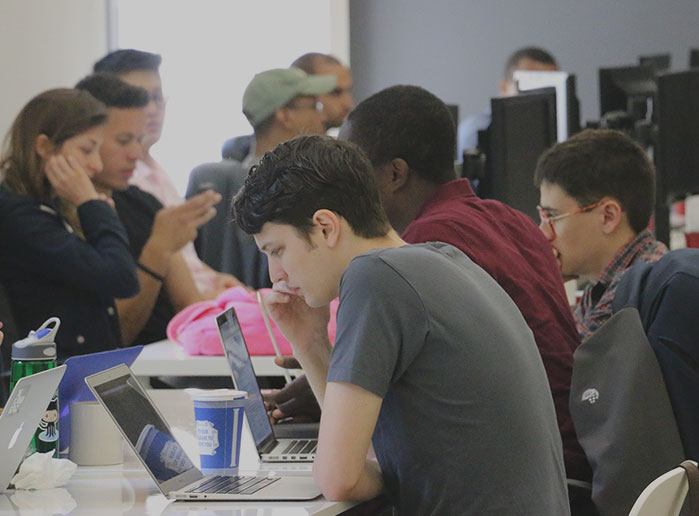Over the past few years, Flatiron School has worked with hundreds of companies to place our students in careers they love. So, what is that special combination of past work experience and programming abilities that our hiring partners look for? Every company has different needs, but deciding on the right person to hire often comes down to a few essential elements.
We took some time to talk to Andy Cipolaro, the Head of Technical Talent at AlphaSights, and he gave us a deeper look into what the industry’s looking for now. Andy hires talent to build the software that powers AlphaSights. Read on to learn not only into what kind of technical talent his company looks for, but also what kind of person fits best in a software developer role.
Tell me about the company you work for, AlphaSights.
AlphaSights was founded in London in 2008, expanded in 2011 to NYC, and now has four major offices globally. We connect our client base of private equity firms, hedge funds, strategy consultancies and corporations to industry practitioners who possess the highly specific business knowledge they are seeking. This helps our clients make more informed decisions going forward. Our software engineering team builds the software that powers the business, including applications that allow us to host conference calls, execute global payments, and manage client work from start to finish.
Andy Cipolaro is the Head of Technical Talent at AlphaSights, where he recruits developers to build the company’s software.
What type of developer is your company looking for?
We’re looking for a lot of different types of developers rather than one set profile. Our engineers need to solve really difficult problems, and we like people with diverse backgrounds since drawing on a range of experiences and perspectives best equips us to solve those challenging problems. We’ve had a lot of success with Flatiron School in particular because it’s an elite program with rigorous training that produces technically strong developers. Their students also embody a lot of the characteristics we find attractive. For example, Flatiron School tends to admit really smart, really motivated people who are committed to careers in software development. That’s ultimately what we like to see when we’re evaluating candidates.
When you’re recruiting for technical talent, what skills do you look for in particular?
Our tech stack on the back-end is primarily Ruby and Ruby on Rails. We like for candidates to have some experience with those technologies before coming on board and to continue to refine those skills once they arrive. In combination with Ruby on Rails, we’re increasingly using client-side frameworks for our front-end development. Currently we’re using Ember and React. We don’t require candidates to have experience using these specific client-side frameworks before coming on board, but we do look for people that we think are quick learners and that can be taught these frameworks.
How does on-boarding work for people who haven’t worked with those JavaScript frameworks?
On-boarding and training is something that’s very important to us at AlphaSights. We’ve developed an apprentice program to on-board and train graduates from Flatiron, allowing them to develop their existing skills and gain new skills through formalized training, independent study, and pair programming with experienced developers. We think this is critical for people that are transitioning into their first role as a professional developer and we think it’s part of the reason why students from Flatiron have been so successful at AlphaSights.
In reality, all past experiences can be relevant in some way. There are many skills that can be picked up from non-technical experiences that can help make you a great developer.
How has the type of employee you hire evolved as your company grows?
Most of the hires we made initially were people with a traditional Computer Science background that had professional experience programming with our technologies. This provided a foundation for us to build a sustainable talent pipeline where we could then begin to hire junior engineers, improve their technical skill sets, and then dip back into the junior talent pool when needed. We hire both computer science students and web developer program students to fill these junior roles. We really like students from Flatiron School because they have such a great foundation and training in Ruby and they are passionate about building great web applications with clean code.
What past experiences do you find are helpful for developers to have besides just the topics of computer science?
In reality, all past experiences can be relevant in some way. There are many skills that can be picked up from non-technical experiences that can help make you a great developer. Amongst career changers, we like to hire people who clearly demonstrate a track record of commitment and success in past roles, regardless of how related or unrelated those roles were to software development. We believe that past performance is generally correlated to future success.
What advice would you give to people who are doing a web developer program and looking to work for a company?
First, I would advise anyone who is considering doing a web developer program to make sure you understand your personal motivators. For example, if you really like problem-solving and building things, then this is potentially a great career path to go down. For people who are looking for their first role as a developer within a company, I suggest that you look for opportunities where the steep learning curve you had in your web developer program will continue and where you can learn directly from experienced developers on a daily basis. Personally, I would also suggest you find a team that will make you laugh at least once per day.
Some job applicants may worry that their experience level in computer programming may work against them in their interview. What would you say to them?
I would suggest that all candidates be fully transparent about their experience and fully own their background. At the end of the day, we don’t make hiring decisions solely based on technical abilities; we extend offers because we think the person as a whole is right for our organization. Any company that you should want to work for will hopefully be doing the same.

For more information about the software engineering team at AlphaSights, visit http://engineering.
Written byFLATIRON SCHOOL
Make yourself useful.


